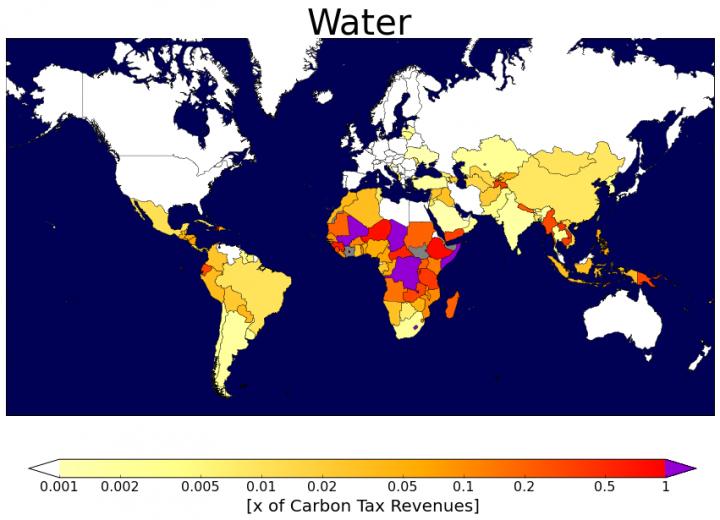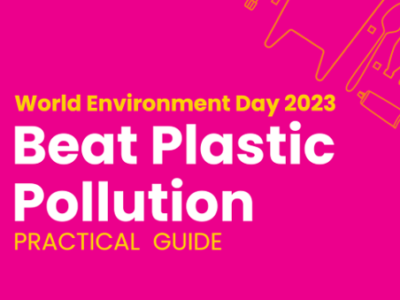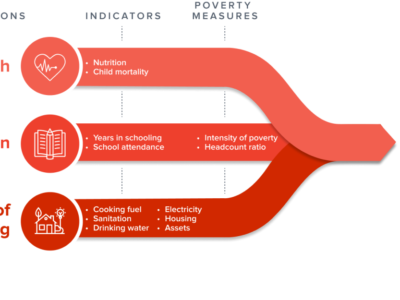“It’s possible to finance the drinking water supply in the majority of countries worldwide by the year 2030,” says Dr. Michael Jacob, lead author of the study from the Mercator Research Institute on Global Commons and Climate Change (MCC) in Berlin. In India alone, a carbon tax would generate around 115 billion US dollars a year, ”and only a fraction of that would be needed for clean water, meaning that enough money would remain for sanitation and electricity,” said the researcher. In fact, the needed infrastructure for this second largest country of the world would consume only about four percent of the revenue from the tax.
That said, there are a few countries, especially in Sub-Saharan Africa (see figure below), where carbon pricing would not suffice, namely because carbon emissions there are so low that they would yield little revenue. “However, this funding gap could be closed when considering that developing countries have not yet exhausted their right to use the atmosphere,” says Jakob. “Avoidance of emissions would then entitle them to compensation payments from industrialized countries.”

The MCC study, which examined the development potential for not only water, sanitation and electricity but also ICT and roads, was published today under the title ”Carbon pricing revenues could close infrastructure gaps” in the journal World Development . In their calculations, the researchers assume that every country in the world is now introducing a steadily increasing carbon tax. In 2020 the tax would have to be 40 US dollars per tonne of CO? emissions and increase up to 175 US dollars by 2030.
“In addition to generating revenue for infrastructure, the tax would thus contribute to the international goal of limiting global warming to two degrees,” explains Dr. Sabine Fuss, co-author of the study who is also a guest researcher at the International Institute for Applied Systems Analysis (IIASA). “This is because the tax penalizes the use of fossil fuels and creates incentives for zero-carbon technologies.” Money not needed for the infrastructure could be used to mitigate climate change impacts such as rising sea levels, which affect in particular the developing countries.
As is well known, raising the price of coal, oil and gas as part of climate protection measures brings its share of problems. “Nobody wants to pay more. But that’s exactly why the idea to fund vital infrastructure directly from carbon revenue has clout,” says Jakob. Linking the revenue to a specific use increases acceptance among the population and decreases the risk of misappropriation. In addition, carbon pricing could be used to reduce the burdens facing in particular the poorer segments of the population, such as the value added tax. “One thing is clear: For climate protection to be effective it must be embedded in a broader sustainable development scheme, and vice versa,” says Jakob. “Simply infusing more money won’t solve the problem. Instead, decisive factors such as a functioning state, democratic decision-making and the relevant institutions must be taken into consideration.”
Source: EurekaAlert
###
Link to the cited study:
Jakob, M.; Chen, C.; Fuss, S.; Marxen, A.; Rao, N.; Edenhofer, O. (2016): Carbon pricing revenues could close infrastructure gaps. World Development , http://dx.doi.org/10.1016/j.worlddev.2016.03.001
About the MCC:
The MCC explores sustainable economic development as well as the use of common goods such as global environmental systems and social infrastructures against the background of climate change. Our seven working groups are active in the fields of economic growth and development, resources and international trade, cities and infrastructures, governance and scientific policy advice. The MCC was co-founded by the Mercator Foundation and the Potsdam Institute for Climate Impact Research (PIK).






This post is really loaded i never realized there were actually laws penalizing legitimately or rather discouraging the use of Co2. When would Nigeria start thinking and implementing things in this direction
Yes, Abdul. There is carbon pricing, a method favored by many economists for reducing global-warming emissions. It is to charge those who emit carbon dioxide (CO2) for their emissions. That charge, called a carbon price, is the amount that must be paid for the right to emit one tonne of CO2 into the atmosphere. I believe when Nigeria become serious, this would be well implemented.
Ok if you say but notice the current temperature of the Sun it has never been as hot as this in Nigeria . I went to a particular area in Port harcourt and because of the gas flaring there people can’t hang their cloths to dry outside anymore because of the gaseosu steins and this has been on for years now so if there are such laws how come all those people are just suffering
People suffer for lack of ignorance/education about something they should know. Apart from the law been in effect, people need to know their rights as citizens and what they can do properly. Here’s why we need people who can really educate and empower communities. An empowered person/community will demand what is right and will get it.